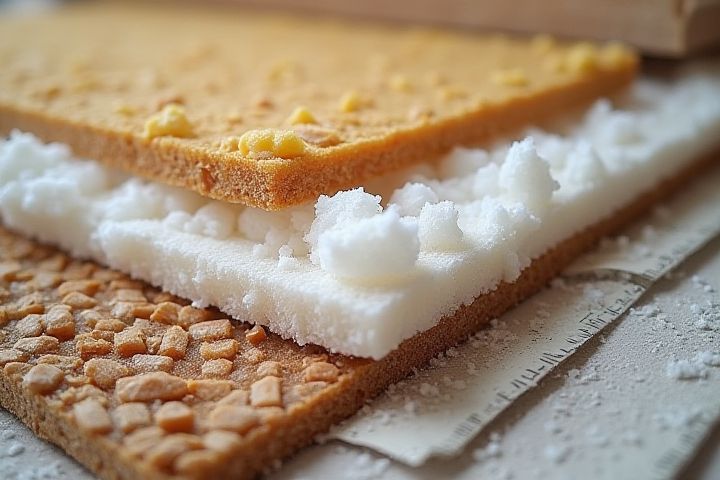
The best materials for house insulation include fiberglass, foam board, cellulose, and mineral wool. Fiberglass is popular due to its cost-effectiveness and fire-resistant properties, while foam board offers high insulating value with a thin profile, ideal for tight spaces. Cellulose, made from recycled paper products, provides excellent thermal performance and is environmentally friendly. Mineral wool, known for its soundproofing qualities, is also resistant to fire and moisture. When choosing insulation, consider factors such as R-value, application area, and material sustainability to enhance your home's energy efficiency effectively.
What Materials Are Best For House Insulation
Fiberglass
Fiberglass insulation, composed of fine glass fibers, is a popular choice due to its excellent thermal resistance and energy efficiency. This material effectively reduces heat transfer, helping to maintain a comfortable indoor temperature while lowering energy bills. It is available in batts, rolls, and loose-fill forms, making it versatile for various applications in walls, attics, and floors. Additionally, fiberglass is non-combustible, resistant to moisture, and can contribute to soundproofing, enhancing the overall comfort of your home.
Cellulose
Cellulose insulation, derived predominantly from recycled paper products, is an eco-friendly option valued for its excellent thermal performance, achieving R-values of 3.2 to 3.8 per inch. This dense material effectively reduces air infiltration and can help lower heating and cooling costs by up to 30%. Fire-retardant treatments enhance its safety profile, making it suitable for homes with significant energy efficiency goals. Installing cellulose typically involves blowing it into spaces, which allows for a seamless fit around structural elements, ensuring comprehensive coverage.
Spray Foam
Spray foam insulation is a highly effective material known for its excellent thermal resistance, achieving an R-value of approximately R-6 to R-7 per inch. Comprised of a polyurethane mixture, it expands upon application to fill gaps and create an air-tight seal, minimizing energy loss. This method not only enhances energy efficiency by reducing heating and cooling costs by up to 50%, but also contributes to moisture control and mold prevention in your home. Furthermore, spray foam insulation is versatile, adaptable for various applications, including attics, walls, and crawl spaces, providing optimal comfort year-round.
Mineral Wool
Mineral wool, also known as rock wool or stone wool, is an excellent insulation material due to its high thermal resistance, typically rated between R-3.2 to R-4.0 per inch. It consists of natural minerals and recycled content, providing effective soundproofing and fire resistance up to 1,200degC (2,192degF). This material is non-combustible, making it a safe choice for residential applications, while also being moisture-resistant, which helps prevent mold growth. When considering insulation options for your home, mineral wool's durability and eco-friendly properties make it a compelling choice for energy efficiency.
Reflective or Radiant Barrier
Reflective or radiant barriers are highly effective insulation materials designed to reduce heat transfer into your home, especially in hot climates. Comprised of foil or reflective surfaces, these barriers reflect radiant heat away from living spaces, potentially lowering cooling costs by up to 10-15%. Ideal installation locations include attics, where they can intercept solar energy before it heats up the insulation below. When considering your home's insulation, incorporating reflective barriers can enhance energy efficiency and improve overall comfort year-round.
Polystyrene Foam Board
Polystyrene foam board is a highly effective insulation material, offering a thermal resistance (R-value) typically ranging from 3.6 to 4.0 per inch, making it ideal for various building applications. Available in both expanded (EPS) and extruded (XPS) forms, EPS is lightweight and environmentally friendly, while XPS provides superior moisture resistance and durability. Foam board insulation is easy to cut and install, fitting seamlessly into wall cavities, floors, and ceilings, greatly enhancing energy efficiency. By incorporating polystyrene foam board into your home, you can significantly reduce heating and cooling costs, potentially lowering your energy bills by up to 15%.
Polyisocyanurate Foam Board
Polyisocyanurate foam board is one of the most effective insulation materials for residential applications, boasting a high thermal resistance (R-value) of approximately 6.5 to 7.0 per inch of thickness. This rigid foam insulation is not only lightweight but also features a foil-faced surface that enhances energy efficiency by acting as a reflective barrier against heat loss. Ideal for both new construction and retrofitting, it performs well in various climates due to its moisture resistance and stability across temperature changes. For your home's insulation needs, consider using polyisocyanurate foam board in areas like roofs, walls, and foundations to ensure optimal energy performance.
Cotton (Denim)
Cotton insulation, particularly denim, is an eco-friendly option derived from post-consumer recycled materials, providing an R-value between 3.5 and 4.0 per inch, which ensures effective thermal performance. This material is known for its excellent sound absorption properties, making it ideal for noise reduction in residential spaces. Lightweight and non-toxic, cotton insulation is also resistant to mold and pests, contributing to a healthier indoor environment. By choosing denim insulation, you can reduce your carbon footprint while benefiting from superior comfort and energy efficiency in your home.
Sheep's Wool
Sheep's wool is an exceptional natural insulation material, offering thermal resistance with a high R-value of around 3.5 to 4.0 per inch. This renewable resource not only effectively regulates temperature but also excels in moisture management, absorbing up to 30% of its weight in water without feeling damp. Unlike synthetic materials, sheep's wool is non-toxic and biodegradable, contributing to a healthier indoor air quality. When considering insulation options for your home, sheep's wool presents a sustainable choice that enhances energy efficiency and comfort.
Aerogel
Aerogel is a highly effective insulation material, boasting a thermal conductivity as low as 0.013 W/m*K, making it one of the best options for energy efficiency in homes. Composed primarily of silica, aerogel is incredibly lightweight, with densities typically around 1-3 kg/m3, which allows for easy handling and installation. Its ability to resist moisture and mold growth enhances indoor air quality, crucial for health and comfort. When incorporated into building designs, aerogel can significantly reduce heating and cooling costs by providing excellent thermal performance, ensuring your home remains comfortable year-round.
